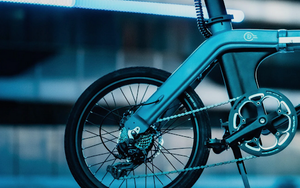Why Are Electric Mountain Bikes So Expensive?
Oct 04, 2024
Electric mountain bikes have gained immense popularity in recent years, offering an exhilarating off-road experience coupled with the convenience of electric assist. However, one question that often arises is, why are electric mountain bikes so expensive? In this article, we will delve into the various factors that contribute to their high price tag and understand the economics behind this burgeoning market.
Understanding the Basics of Electric Mountain Bikes
Before we explore the cost factors, let's first familiarise ourselves with the basic components of electric mountain bikes. These bikes integrate traditional mountain bike features with an electric motor and battery, providing riders with extra power to conquer challenging terrains effortlessly.
The key components of an electric mountain bike include the frame, suspension, brakes, drivetrain, battery, and motor. Each of these elements plays a crucial role in determining the overall performance and, subsequently, the cost of the bike.
Frame
The frame, often made of lightweight and durable materials like aluminium or carbon fibre, forms the backbone of the electric mountain bike. It must be strong enough to withstand the rugged demands of off-road riding while also accommodating the motor and battery.
Suspension Systems
Suspension systems, including front forks and rear shocks, are vital for smoothing out bumps and absorbing impact during descents and rough trails. These components enhance rider comfort and control, but they also contribute to the overall cost of the bike.
Brakes
Brakes are another essential aspect of electric mountain bikes, ensuring reliable stopping power in all conditions. High-quality hydraulic disc brakes are often utilised in these bikes, offering superior performance and durability.
Drivetrain
The drivetrain, consisting of gears, chain, and derailleur, enables riders to switch between various gear ratios, facilitating efficient pedalling on both uphill and downhill sections. This system can significantly affect the bike's functionality and price.

The Technology Behind Electric Mountain Bikes
Now, let's explore the advanced technology that distinguishes electric mountain bikes from their traditional counterparts. The heart of these bikes lies in the battery and motor, which work together to provide pedal-assist power.
The battery, typically a high-capacity lithium-ion pack, stores the energy required to power the electric motor. These batteries are designed to provide extended range and robust reliability, although they come at a higher cost compared to conventional bike batteries.
The electric motor, mounted near the bike's pedals, senses the rider's pedalling motion and amplifies it with electric power. These motors come in various types, such as hub-drive and mid-drive, each offering different advantages in terms of power delivery and efficiency.
The Cost Factors of Electric Mountain Bikes
With electric mountain bikes ranging from around £699 for the the Himo Z20, to £2,699 for the Cyrusher Trax, it can be difficult to understand the various price differences. Now that we understand the basic components and technology of electric mountain bikes, let's delve into the cost factors that contribute to their higher price range compared to regular mountain bikes, especially as a recent study found that 90% of participants said that cost was the main barrier to participation in electric mountain bikes.
The Role of Battery and Motor in Pricing
The battery and motor are the most significant cost factors in electric mountain bikes. Advanced battery technology and high-performance motors not only enhance the bike's power and range but also increase its price. Manufacturers invest in research and development to improve battery efficiency and motor performance, leading to higher production costs.
Moreover, premium battery and motor components often come from specialised manufacturers, further adding to the overall cost. However, these investments result in better performance and a more enjoyable riding experience for electric mountain bike enthusiasts.
The Impact of Material and Design on Cost
The choice of materials and design also significantly influence the pricing of electric mountain bikes. High-end models often feature lightweight frames constructed from carbon fibre, offering excellent strength-to-weight ratios. These frames require meticulous engineering and precise manufacturing, making them more costly to produce.
In addition, the integration of advanced suspension systems and components made from premium materials, such as high-grade aluminium or titanium, further contribute to the overall cost of electric mountain bikes. The use of these materials enhances durability, performance, and rider comfort but comes with a higher price tag.

The Manufacturing Process of Electric Mountain Bikes
Behind the scenes, the manufacturing process of electric mountain bikes is intricate and multi-faceted, which also plays a role in their higher prices.
The Complexity of Production
The production of electric mountain bikes involves intricate assembly processes and specialised equipment. Manufacturers have to integrate the electric motor, battery, and associated components seamlessly into the frame while maintaining structural integrity.
Assembly and quality control procedures are meticulous, ensuring that each bike meets strict standards. The complexity and precision required in the manufacturing process contribute to the overall cost of electric mountain bikes.
The Influence of Labor and Manufacturing Costs
Labour costs are another factor that impacts the final price of electric mountain bikes. Skilled technicians and engineers handle the complex assembly of these bikes, resulting in higher labour costs compared to traditional mountain bikes.
Furthermore, electric mountain bikes are often produced in limited quantities, and their specialised manufacturing requires expensive equipment and facilities. These overhead costs are also factored into the bikes' price, making them more expensive than mass-produced bicycles.
The Market Dynamics for Electric Mountain Bikes
Aside from the engineering and manufacturing factors, market dynamics and supply and demand equations also influence the prices of electric mountain bikes.
The Demand and Supply Equation
The increasing popularity of electric mountain bikes has fueled a higher demand for these cutting-edge rides. Increased demand often leads to higher prices as manufacturers strive to meet the market's appetite while recouping their investments in research and development.
Furthermore, limited supply and distribution networks for electric mountain bikes, especially in remote locations, can also drive prices upwards due to logistical challenges and associated costs.
The Effect of Branding and Marketing on Price
Branding and marketing activities play a crucial role in shaping consumer perceptions and influencing purchasing decisions. Well-established brands that invest heavily in marketing and advertising efforts often command higher prices due to their perceived quality and reputation in the market.
These brands invest significantly in research, development, and customer support, all of which contribute to higher costs that are ultimately passed on to the consumer.

The Future of Electric Mountain Bikes
Looking ahead, the future of electric mountain bikes holds exciting possibilities and potential advancements that could impact their pricing.
Predicted Trends in Pricing
As battery and motor technology continue to improve, it is expected that the cost of these essential components will gradually decrease. Advancements in manufacturing processes and economies of scale may also contribute to more competitively priced electric mountain bikes in the future.
Furthermore, as the market for electric mountain bikes becomes more established and competitive, we may see a wider range of price options to suit different budgets and preferences.
Innovations That Could Lower the Cost
Innovations in materials, such as the development of more affordable carbon fibre composites or new manufacturing techniques, have the potential to lower the production costs of electric mountain bikes.
Additionally, advancements in battery technology and increased competition in the electric motor industry may lead to more accessible and cost-effective components, eventually trickling down to affordable electric mountain bikes.

Conclusion
In conclusion, multiple factors contribute to the higher price range of electric mountain bikes. The advanced technology, specialised components, meticulous manufacturing processes, and supply and demand dynamics all play a role in shaping their pricing. As the market continues to evolve and technological advancements progress, we can hope to see more affordable options without compromising the performance and exhilaration that electric mountain bikes offer.
View our full range of electric mountain bikes here and get riding!






